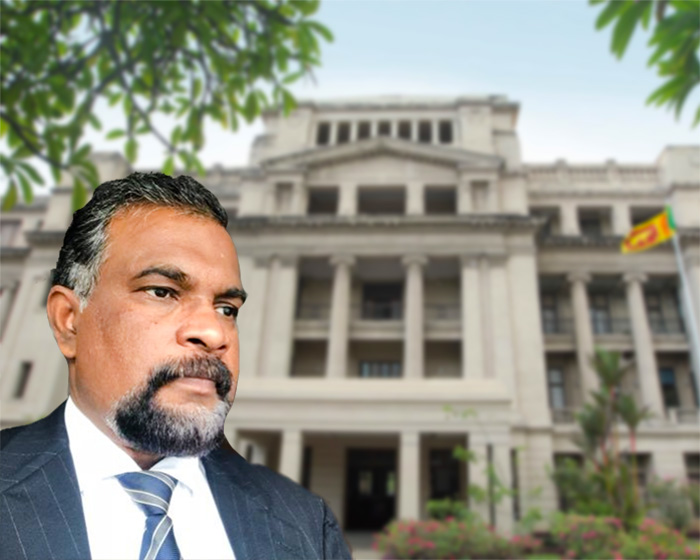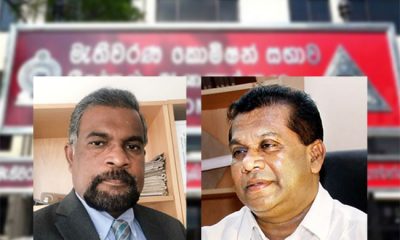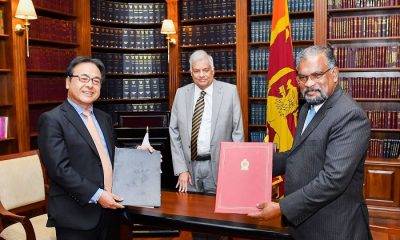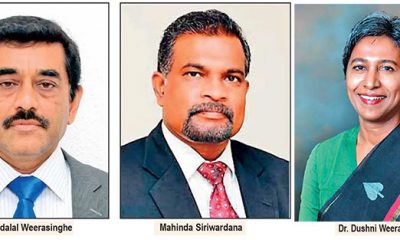News
Economic crisis: Treasury Chief frowns on home-grown remedy tried by GR regime

Secretary to the Treasury and Finance Ministry Mahinda Siriwardana has said that even if Sri Lanka achieves the goal of zero corruption, tax revenue will still have to be increased to bridge the budget deficit and lessen the country’s debt burden.
Referring to the Supreme Court ruling pertaining to economic management delivered on Nov 14, 2023, Siriwardena said it was imperative that elected representatives and state officials ensure proper econmic management.
Pointing out that Sri Lanka’s government revenue as a percentage of GDP had been as low as 8.3 percent in 2021, Siriwardana said that the situation was so bad that the government found it difficult to meet day-to-day expenses.
The SC judgment had said the state officials under any circumstances couldn’t absolve themselves of the responsibility for acting in the best interests of the public and were entrusted with significant powers to uphold public trust, requiring them to adhere to the directives of the Constitution, Siriwardana said.
The Treasury Secretary said so delivering the inaugural Prof. K. Dharmasena memorial lecture at the Kelaniya University on Monday (Jan 30) close on the heels of undergraduates storming the main administrative building there to protest against a planned visit by President Ranil Wickremesinghe the following day.
Siriwardana succeeded S.R Attygalle in early April 2022 amidst the worst-ever economic crisis.
The Treasury Secretary explained why President Gotabaya Rajapaksa’s government had failed to secure a Rapid Financing Instrument (RFI) at the early staes of the crisis.
Although President Gotabaya Rajapaksa sought RFI from the International Monetary Fund (IMF) in April 2020, five months after being elected, his administration failed to accept the IMF prescribed immediate debt restructuring. Instead of adopting a strategy of macroeconomic reforms to restore fiscal and external buffers supported by the IMF, the government had opted for what Siriwardana called a home-grown solution.’
Sri Lanka sought RFI in the wake of significant tax reforms with sharp reductions in VAT (Value-Added Tax) and income tax rates and large increases in tax free thresholds. “When taxes were reduced at the end of 2019, nobody questioned how public services would be funded. The result was an unprecedented escalation in debt, leading to this economic crisis.
Siriwardana pointed out that for want of cohesive corrective measures to address the issues at hand, credit ratings continued to deteriorate. By September 2020, Moody’s had downgraded Sri Lanka to Caa1, Fitch downgraded Sri Lanka to CCC by November 2020, and S&P downgraded Sri Lanka to CCC by December 2020, Siriwardana pointed out.
“There have been long-standing structural weaknesses in the Sri Lankan economy which have been neglected for many decades, given the pain associated with remedying these issues. The weaknesses include fiscal sector imbalances, inadequate external policy buffers, financial and monetary sector vulnerabilities, deficiencies in governance, and shortcomings in the legal and institutional framework in the country. The recent external shocks faced by the country, including the Easter Sunday attacks, the COVID-19 pandemic, the Russia-Ukraine conflict, coupled with significant domestic policy errors, exposed these macroeconomic vulnerabilities and triggered the prevailing economic crisis.”
In macroeconomic terms, the crux of the problem has always been the persistent twin deficits – budget deficits in the fiscal account and current account deficits in the balance of payments (BOP) accounts, Siriwardana added.
The Treasury Secretary said that the country should have changed its unsustainable practices, beginning 2006/2007, when the opportunity to access concessional foreign financing diminished in the wake of Sri Lanka’s per capita GDP crossed the middle income threshold. Instead of gradually and significantly reducing its deficits and borrowing requirements, the then government shifted to commercial borrowings, primarily in the form of international sovereign bonds (ISBs). “Most of these bonds have up to a 10-year maturity periods, so, until around 2019, Sri Lanka did not face much difficulty in terms of repayment pressures for external debt.”
Siriwardana also discussed the often raised issue of whether ISBs caused the debt crisis. In fact, the government at the time made a conscious decision to raise additional funds amounting to USD 2.4 billion in long term ISBs to ensure Sri Lanka would have sufficient reserve buffers to get through a period of volatility amidst the election cycles of 2019 and 2020, Siriwwardana said. ” There have been claims that this increase in ISB borrowings was a cause of the debt crisis – however in reality, it was the additional reserve buffers created by those ISBs that enabled the government to avoid a crash in the economy during the worst of the COVID-19 pandemic.
“The government maintained primary surpluses in 2017 and 2018, indicating that the ISB borrowings were not driven by budget deficits, but in order to build up reserves and to improve the quality of reserves by converting maturing short term debt into longer term stable instruments such as ISBs and syndicated loans. The fundamental drivers of the economic crisis were fiscal and debt unsustainability, whereas ISBs were just one of many financing instruments.”
Siriwardana said: “There have been various theories as to what caused the economic crisis, including the COVID-19 pandemic, ISB borrowings, the Debt Standstill policy. However, it is clear that the fundamental cause has been long standing macroeconomic vulnerabilities and domestic policy errors. There have also been various alternative proposals and theories as to how the country can recover without the citizens having to bear a burden. But, we have seen today that measures such as asset recovery, collection of taxes in arrears, elimination of corruption, while all being essential actions, do not serve as an alternative to the macroeconomic reforms being implemented today. Those are reforms that were known to all of us for years if not decades. But, those much needed reforms were delayed mainly due to political reasons. In the past, and up to now, the present generation lived a better life by borrowing thereby sacrificing the lives of the future generations.
“However, it is critical to understand that now we have come to a situation where the present generation should make sacrifices for the betterment of the lives of the future generations.” (SF)
News
US sports envoys to Lanka to champion youth development

The U.S. Embassy in Colombo welcomed the U.S. Sports Envoys to Sri Lanka, former National Basketball Association (NBA) and Women’s National Basketball Association (WNBA) players Stephen Howard and Astou Ndiaye, from June 8 through 14.
The Public Diplomacy section of the U.S. Embassy said that it would launch a weeklong basketball program intended to harness the unifying power of sports, made possible through collaboration with Foundation of Goodness and IImpact Hoop Lab.
While in Sri Lanka, Howard and Ndiaye, both retired professional basketball players, will conduct a weeklong program, Hoops for Hope: Bridging Borders through Basketball. The Sports Envoys will lead basketball clinics and exhibition matches and engage in leadership sessions in Colombo and Southern Province for youth aged 14-18 from Northern, Uva, Eastern and Western Provinces, offering skills and leadership training both on and off the court. The U.S. Envoys will also share their expertise with the Sri Lanka Basketball Federation, national coaches, and players, furthering the development of basketball in the country. Beyond the clinics, they will collaborate with Sri Lankan schoolchildren to take part in a community service project in the Colombo area.
“We are so proud to welcome Stephen and Astou as our Sports Envoys to Sri Lanka, to build on the strong people-to-people connections between the United States and Sri Lanka,” said U.S. Ambassador Julie Chung. “The lessons that will be shared by our Sports Envoys – communication, teamwork, resilience, inclusion, and conflict resolution – are essential for leadership development, community building, equality, and peace. The U.S. Sports Envoy program is a testament to our belief that sports can be a powerful tool in promoting peace and unity.”
News
Rahuman questions sudden cancellation of leave of CEB employees

SJB Colombo District MP Mujibur Rahuman in parliament demanded to know from the government the reasons for CEB suspending the leave of all its employees until further notice from Thursday.
MP Rahuman said that the CEB has got an acting General Manager anew and the latter yesterday morning issued a circular suspending leave of all CEB employees with immediate effect until further notice.
“We demand that Minister Kanchana Wijesekera should explain this to the House. This circular was issued while this debate on the new Electricity Amendment Bill was pending. There are many who oppose this Bill. The Minister must tell parliament the reason for the urge to cancel the leave of CEB employees,” the MP said.However, Speaker Mahinda Yapa Abeywardena prevented Minister Wijesekera responding to the query and said that the matter raised by MP Rahuman was not relevant.
News
CIPM successfully concludes 8th Annual Symposium

The Chartered Institute of Personnel Management (CIPM) successfully concluded the 8th Annual CIPM Symposium, which took place on 31st May 2024. Themed “Nurturing the Human Element—Redefining HRM in a Rapidly Changing World,” the symposium underscored the pivotal role of human resource management (HRM) in today’s dynamic global landscape. Since its inception in 1959, CIPM has been dedicated to advancing the HR profession through education, professional development, and advocacy, solidifying its position as Sri Lanka’s leading professional body for HRM.
Ken Vijayakumar, the President of the CIPM, graced the occasion as the chief guest. The symposium commenced with the welcome address by the Chairperson, Prof. Arosha Adikaram, followed by the Web Launch of the Symposium Proceedings and Abstract Book by the CIPM President. The event featured distinguished addresses, including a speech by Chief Guest Ken Vijayakumar, President of CIPM, and an address by Guest of Honor Shakthi Ranatunga, Chief Operating Officer of MAS Holdings Pvt. Ltd., Sri Lanka.
The symposium also featured an inspiring keynote address by Prof. Mario Fernando, Professor of Management and Director of the Centre for Cross Cultural Management (CCCM) at the University of Wollongong, Australia.
Vote of Thanks of the inauguration session was delivered by Dr. Dillanjani Weeratunga, Symposium Co-chair.
The symposium served as a comprehensive platform for researchers to present their findings across a wide range of critical topics in HRM. These included Cultural Diversity and Inclusion, Talent Development and Retention, Ethical Leadership and Corporate Social Responsibility, Adapting to Technological Advancements, Mental Health and Well-being at Work, Global Workforce Challenges, Employee Empowerment, and Reskilling and Upskilling.
The plenary session was led by Prof. Wasantha Rajapakse. Certificates were awarded to the best paper presenters during the valedictory session, followed by a vote of thanks delivered by Kamani Perera, Manager of Research and Development.
The annual symposium of CIPM was a truly inclusive event, attracting a diverse audience that spanned undergraduates, graduates, working professionals, research scholars and lecturers. This widespread interest highlights the symposium’s significance in the field of HRM, offering a unique opportunity for everyone to network and learn from scholarly brains.The CIPM International Research Symposium was sponsored by Hambantota International Port, Sri Lanka Institute of Information Technology (SLIIT), E B Creasy & Co. PLC, and Print Xcel Company.


















